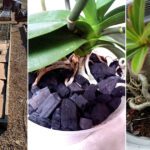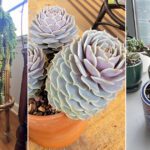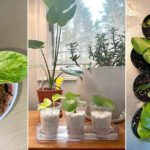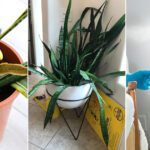Tan flowers, or those with shades of brown, are pretty uncommon, but there are surely some cool options you could have!
While everyone loves the bright reds, pinks, yellows, and oranges that flowering plants bring to the garden, have you ever wondered how some unconventional hues can add an extra layer of beauty to the space? One such color is tan brown, which symbolizes nature, food, and the cycle of life, as per Feng Shui. If you are planning to add some tan flowers to your yards, we have the best options for you!
Best Tan Flowers
1. Dahlia
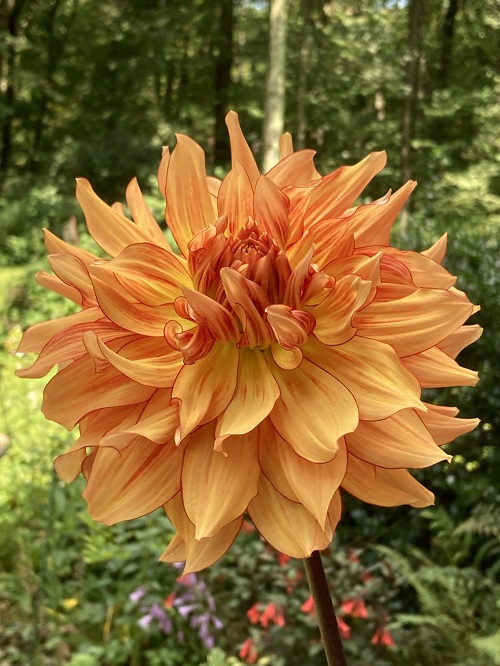
Botanical Name: Dahlia pinnata
Among the array of colors Dahlia flowers boast, the ‘Brown Sugar’ variety stands out with its unique rusty orange hue, which looks somewhat tanned from a distance. Other tanned varieties include ‘Peaches and Cream; and ‘Apricot Desire. ‘
2. Columbines

Botanical Name: Aquilegia spp.
Columbines feature delicate, lobed leaves and nodding, bell-like flowers in tan, brown, or rusty shades. Varieties like ‘Chocolate,’ ‘Single Black,’ and ‘Roman Bronze’ show a tanned brown color, while ‘Futaba Lantern’ and ‘William Guinness’ add hints of orange and maroon.
These mid-spring flowers also come in dual colors, adding floral accents to woodland gardens or mixed perennial beds.
3. Bearded Irises

Botanical Name: Iris germanica
With tall stems and ruffled, fan-like petals, Ruffled Irises come in an array of tan and bronze shades, particularly in varieties like ‘Rodeo Girl,’ ‘Spiced Tiger,’ and ‘Living Legacy.’ Blooming in late spring to early summer, filling the garden beds with a soft, floral fragrance.
4. Angel Amber Kiss Pansy

Botanical Name: Viola cornuta
This biennial plant, also called the ‘Horned Pansy Angel Amer Kiss’ (quite a mouthful, we know!), features relatively small flowers with overlapping petals that display a mix of golden-brown and orange hues. As biennials, they can bloom from late spring through summer, bringing rich color to beds, containers, and garden paths.
5. Daylilies

Botanical Name: Hemerocallis spp.
While traditional daylily types typically don’t display tan or brown colors, newer variations such as ‘Sir Mod Red’ and ‘Sweet Hot Chocolate’ feature flowers in rusty tan shades. Among spider-type daylilies, ‘Brown Recluse’ stands out with its rich mahogany blooms that gradually fade to a lighter tan, accented by distinct yellow edges and midribs.
6. Oriental Poppy

Botanical Name: Papaver orientale
Get some fall colors in your garden with this oriental poppy variety, ‘Royal Chocolate Distinction’! Though, on a closer look, you will find it has bronze-red petals on upward-facing disc-shaped flowers, the solitary flowers look tan or brown at first glance.
7. Boat Orchids

Botanical Name: Cymbidiums ‘Charlie Brown’
The ‘Charlie Brown’ variety of Boat Orchids offers a warm autumnal palette with shades of brown, including tan, peach, and a crimson throat. The blooms are nestled among slender, arching leaves, beautifying the gardens and homes in cooler fall months.
8. Tropical Hibiscus

Botanical Name: Hibiscus rosa-Sinensis
Hybrid varieties of Tropical Hibiscus break the mold with unexpected colors like charcoal, gray, and tan, along with the classic bright red, yellow, and pink hues. Varieties like ‘Key Largo,’ ‘Pocahontas,’ and ‘Creme de Cacao’ are the perfect choice among the tanned tones, offering large, glossy blooms that shine from summer through fall.
9. Antler Orchids

Botanical Name: Dendrobium discolor
Antler Orchids feature smaller, wavy flowers ranging from 1 to 3 inches wide. Their petals come in various colors like light brown, tan, and reddish-brown, perched atop tall 20-inch stems. What really makes these orchids pop is their distinctive labellums, marked in mauve or purple.
10. Graham Thomas Austin Rose

Botanical Name: Rosarium baden rosa ‘Graham Thomas’ Austin
An extremely prized variety of climbing roses, this variety is so popular for very good reasons! Firstly, though each flower showcases double petals in a rich golden color, they showcase beautiful tints of brown at the edges, displaying a gorgeous gradient. Besides the exquisite tea-like fragrance, each flower uniquely presents with 30 or more petals!
11. Blanket Flower

Botanical Name: Gaillardia spp.
Living up to its name, this flower, commonly found throughout North America, forms a blanket all over your garden grounds. Though it has red petals with yellow edges, its rich brown centers give it a unique appearance.
12. Charlie Brown Rose

Botanical Name: Rosa ‘Charlie Brown Rose’
A miniature cultivar of roses, this flowering species starts blooming in the summer with numerous small brown flowers, each 2 inches wide and, on average, featuring 8 to 15 petals. This plant is amazing for containers as it is a tidy and disease-resistant shrub that also exudes a mild, sweet fragrance.
13. Absalon Tulip

Botanical Name: Tulipa ‘Absalon’
Yet another rarely seen flower variety is this tulip with chocolate brown petals complete with bright yellow swirl patterns. It is actually an heirloom variety of tulips that dates back to 1780 and is also referred to as a “bizarre” or “broken” tulip because of its patterns and coloring.
Fun fact: This tulip variety was actually infected by TBV, or the Tulip Breaking Virus, which resulted in its unusual coloring and patterns.
14. Echibeckia ‘Summerina Brown’

Botanical Name: Rudbeckia x Echinacea
As you can already gauge, this fast-growing, disease-resistant variety is a cross between Rudbeckia and Echinacea and it produces long-lasting flowers showcasing several colorations. The petals are dark chocolate brown with orange edges, and surrounding these petals is a large dark brown cone, making the flowers quite unique.
15. Chocolate Orchid

Botanical Name: Dendrobium johannis
This variety features flowers with a deep red-brown color that also gives off a sweet chocolate scent. Having this orchid in your home would be quite a win-win situation, and if you do grow it indoors, ensure keeping it away from intense direct sunlight and in a space with high humidity.
16. Chocolate Cosmos

Botanical Name: Cosmos atrosanguineus chocamocha
This flowering plant is a tuberous perennial featuring gorgeous velvety flowers in a dusky brownish-red coloration that blooms during late summer. The Chocolate Cosmos is named so not just because of its brown blooms but also because the flowers give off a scent that can only be defined accurately as a mixture of vanilla and hot chocolate.
17. Calico Flower

Botanical Name: Aristlochia littoralis
With indisputably brown flowers, the floppy Calico flowers resemble rotting meat in color and texture! While their appearance and unpleasant fragrance might not appeal to us, this feature is important in attracting the pollinating flies they rely on.
18. Corpse Flower

Botanical Name: Rafflesia arnoldii
Correctly dubbed one of nature’s hitchhikers, this intriguing flowering plant is actually parasitic, i.e., it lives off other plants. But the highlight is that it claims to have the “largest flowers in the world,” and that’s quite true, thanks to the brown blooms that are one meter wide!

